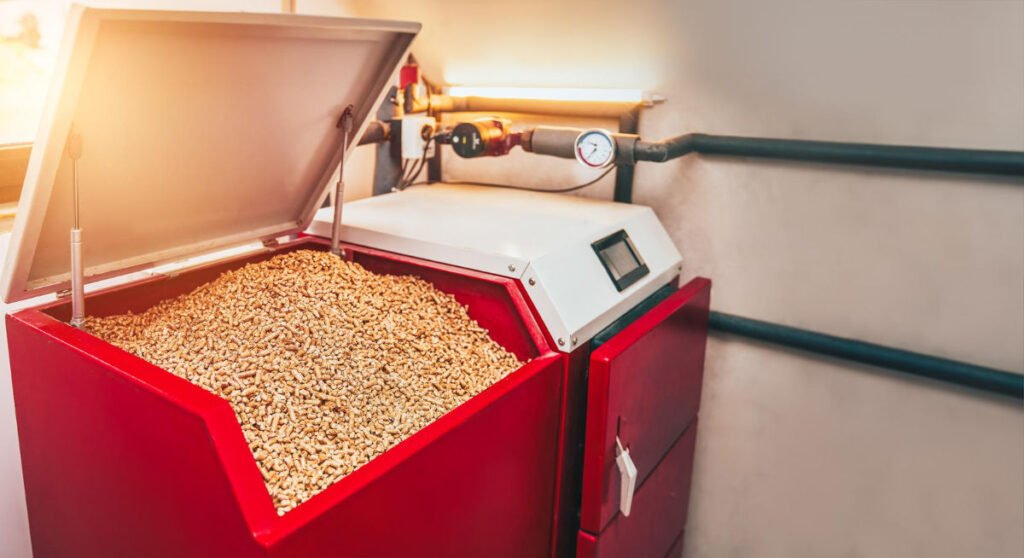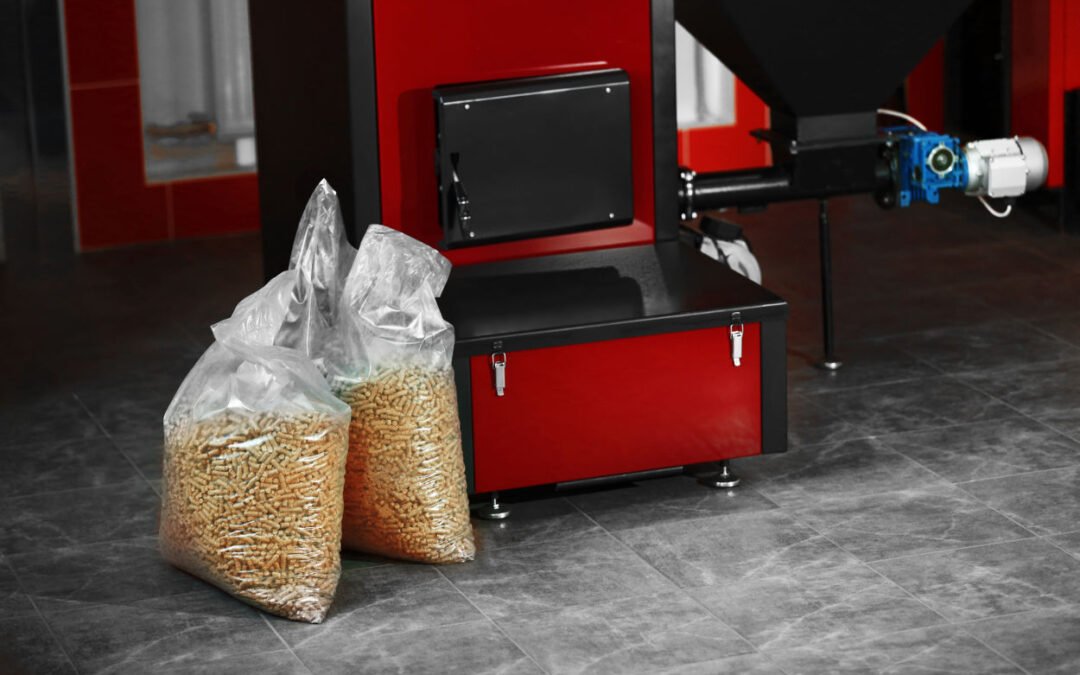Biomass boilers have emerged as a popular alternative to traditional heating systems, offering an eco-friendly solution for domestic use. These boilers utilise organic materials, like wood pellets, to produce energy, contributing to reduced carbon footprints. As global awareness of environmental issues grows, more village households are turning to biomass boilers to meet their heating needs sustainably.
The variety of biomass boilers available can cater to different household requirements, making it essential to understand their functionality. Biomass boilers work by burning renewable sources such as wood pellets, wood chips, or logs to produce heat. This process not only supports the environment by using sustainable resources but also provides a reliable heating solution for homes.
Choosing the right boiler involves considering several factors, including fuel type, cost, and installation space. Whether you’re considering a switch from a traditional heating method or installing a new system, understanding the basics of biomass boilers is crucial to making an informed decision.
Types of Biomass Boilers for Domestic Use
Biomass boilers come in various types, each offering unique benefits that cater to different household needs. The most common types are wood pellet boilers, wood chip boilers, and log-fed boilers, each with its characteristics and operational processes.
Wood Pellet Boilers: These are perhaps the most popular choice for domestic use due to their efficiency and convenience. Wood pellets are compact, have a high energy density, and are easy to store and transport. They offer automated feeding systems, which simplify maintenance and operation, making them ideal for homeowners seeking minimal hassle.
Wood Chip Boilers: These are well-suited for properties with more extensive heating demands, often requiring a larger storage space for the chips. Although they tend to be less expensive in terms of fuel cost, they require more manual intervention compared to wood pellet boilers. This option is often favoured in rural settings where wood chips are abundant and readily available.
Log-fed Boilers: Ideal for those who have access to a steady supply of logs, these boilers are the most labour-intensive but can be cost-effective. Log-fed boilers require manual loading, which can be a disadvantage for those looking for convenience. However, they offer the benefit of using locally sourced wood, which can reduce costs significantly.
Key Factors to Consider When Choosing a Biomass Boiler
When selecting a biomass boiler, several critical factors come into play. Making the right choice involves evaluating these factors in the context of your specific household needs.
- Fuel Type and Availability: Consider the type of fuel that is most readily available in your area. While wood pellets are widely accessible, wood chips and logs may offer cost advantages if they are locally sourced.
- Space Requirements: The space available for installation and fuel storage can influence your choice. Wood chip boilers typically require more storage space, while wood pellet boilers need less due to their compact fuel form.
- Maintenance Level: Evaluate how much time and effort you are willing to invest in maintaining your boiler. Wood pellet boilers often feature automated systems that reduce maintenance needs, whereas log-fed boilers require regular manual intervention.
These factors play a vital role in ensuring that your choice of a biomass boiler aligns with your lifestyle and practical needs.
Fuel Availability and Storage: What You Need to Know
Fuel availability and storage are fundamental considerations when selecting a biomass boiler. Ensuring a consistent supply of your chosen fuel type is essential for the efficient operation of your heating system.
Wood Pellets: These are widely available and can be purchased in bags or bulk deliveries. When considering wood pellets, ensure you have adequate, dry storage space to maintain their quality and efficiency. Automated systems in wood pellet boilers often demand less frequent refuelling, which is convenient for busy homeowners.
Wood Chips: If you opt for a wood chip boiler, assess the local availability of this fuel. Wood chips require more storage space than pellets due to their bulkier nature. Additionally, they must be kept dry to prevent degradation, which can impact the boiler’s performance.
Logs: For log-fed boilers, sourcing logs locally can be cost-effective, but they require significant storage space and protection from moisture. This option is most suitable for those with a reliable supply of logs and the means to store them adequately.
Understanding these storage and availability considerations will help you choose a biomass boiler that fits seamlessly into your household routine.
Assessing Your Heat Demand for Optimal Boiler Selection
Determining your home’s heat demand is crucial in selecting the right biomass boiler. An accurate assessment ensures that the boiler you choose can meet your heating needs efficiently without excessive energy waste.
Begin by evaluating the size of your property and its insulation level. Larger homes or those with poor insulation may require a more powerful boiler. In contrast, smaller or well-insulated properties might benefit from a less powerful, more efficient model.
Consider your daily heating requirements, including hot water usage. Understanding your peak demand times can help you choose a boiler with the appropriate output capacity, ensuring comfort and efficiency.
Consulting with a professional can provide insights into your specific needs, helping you avoid the pitfalls of under or over-sizing your biomass boiler. This step is essential for ensuring optimal performance and energy efficiency in your home.
Maintenance Requirements for Different Biomass Boiler Types
Maintenance is an important aspect of owning a biomass boiler, influencing its longevity and operational efficiency. Different types of biomass boilers have varying maintenance needs that should be considered when making your choice.
Wood Pellet Boilers: These boilers typically feature automated systems that minimize maintenance requirements. Regular checks and annual servicing are usually sufficient to keep them running smoothly. This makes them a preferred choice for those seeking convenience.
Wood Chip Boilers: Maintenance for wood chip boilers can be more intensive, as they may require frequent cleaning to remove ash and other residues. Regular inspections ensure the system remains efficient and safe to operate. Homeowners should be prepared for more hands-on involvement with this type of boiler.
Log-fed Boilers: These boilers demand the most maintenance due to their manual feeding process. Regular cleaning and ash removal are necessary to maintain efficiency and performance. The hands-on nature of log-fed boilers appeals to those who prefer a more traditional approach to heating.
Understanding these maintenance needs can help you choose a biomass boiler that aligns with your lifestyle and availability for upkeep tasks.
Evaluating Cost, Efficiency, and Emissions
The cost, efficiency, and emissions of a biomass boiler are interrelated factors that significantly impact your decision. A thorough evaluation of these aspects ensures that the boiler you choose is both economically and environmentally viable.
Cost: Initial installation costs can vary significantly between different types of biomass boilers. Wood pellet boilers, while typically more expensive upfront, offer lower operational costs due to their efficiency and automated systems. Consider the long-term savings on fuel and maintenance when evaluating cost.
Efficiency: Biomass boilers are generally highly efficient, but the level of efficiency can vary by type. Wood pellet boilers are known for their high efficiency due to the consistent quality and energy density of the pellets. In contrast, wood chip and log-fed boilers may have variable efficiency based on the quality of the fuel used.
Emissions: Biomass boilers produce lower emissions compared to fossil fuel systems. However, the type of biomass fuel used can affect emission levels. Wood pellet boilers typically produce the lowest emissions due to the controlled burning process, while wood chip and log-fed boilers might emit more depending on the moisture content and combustion efficiency.
Evaluating these factors will help you choose a biomass boiler that meets your financial and environmental goals.
Space Requirements for Biomass Boiler Installation
The space required for installing a biomass boiler is a critical consideration, as it impacts the feasibility and practicality of your heating solution. Each type of boiler has different spatial needs for both the unit itself and fuel storage.
Wood Pellet Boilers: These boilers are compact and require minimal space for both the unit and fuel storage. Pellets can be stored in bags or silos, offering flexibility in storage solutions, which is ideal for homes with limited space.
Wood Chip Boilers: Due to the bulkiness of the fuel, wood chip boilers demand more storage space. An external storage area or a dedicated room is often necessary, making them more suitable for properties with ample space.
Log-fed Boilers: These boilers require significant space for both the unit and log storage. Logs need to be kept dry and easily accessible, necessitating a larger, well-ventilated storage area. This makes them best suited for rural properties with available space for wood storage.
Considering these space requirements will ensure a smooth installation process and efficient operation of your biomass boiler.
Comparing Wood Pellet Boilers, Wood Chip Boilers, and Log-fed Boilers
When comparing wood pellet boilers, wood chip boilers, and log-fed boilers, it’s essential to weigh their advantages and drawbacks to determine the best option for your home.
Wood Pellet Boilers
- Advantages:
- High efficiency and low emissions
- Automated feeding system for convenience
- Compact storage needs
- Disadvantages:
- Higher initial cost
- Dependence on pellet supply
Wood Chip Boilers
- Advantages:
- Lower fuel cost if chips are locally sourced
- Suitable for larger properties
- Disadvantages:
- Requires more storage space
- More maintenance due to manual aspects
Log-fed Boilers
- Advantages:
- Cost-effective if logs are readily available
- Traditional, hands-on heating method
- Disadvantages:
- Labour-intensive maintenance
- Large storage space required
By understanding these aspects, you can select a boiler that aligns with your lifestyle, budget, and energy needs.
Conclusion: Making an Informed Decision for Your Home Heating Needs
Choosing the right biomass boiler involves a careful consideration of various factors, from fuel availability and maintenance to cost and space requirements. By understanding these elements, you can ensure a seamless integration of a biomass boiler into your home, offering an efficient and sustainable heating solution.
Whether you opt for the convenience of wood pellet boilers, the economical benefits of wood chip boilers, or the traditional appeal of log-fed boilers, each choice offers unique advantages tailored to different needs. Assessing your specific circumstances, such as heat demand and available space, will guide you in making a decision that aligns with your personal and environmental goals.
For those ready to transition to a more sustainable heating solution, taking the first step involves thorough research and consultation with experts. Embrace the benefits of biomass boilers and contribute to a greener future, all while enjoying the comfort of a warm and eco-friendly home.



